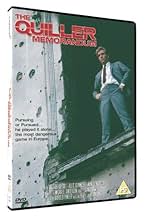Das Quiller Memorandum - Gefahr aus dem Dunkel
Originaltitel: The Quiller Memorandum
IMDb-BEWERTUNG
6,3/10
4498
IHRE BEWERTUNG
Füge eine Handlung in deiner Sprache hinzuIn the West Berlin of the 1960s, two British agents are killed by a Nazi group, prompting British Intelligence to dispatch agent Quiller to investigate.In the West Berlin of the 1960s, two British agents are killed by a Nazi group, prompting British Intelligence to dispatch agent Quiller to investigate.In the West Berlin of the 1960s, two British agents are killed by a Nazi group, prompting British Intelligence to dispatch agent Quiller to investigate.
- Nominiert für 3 BAFTA Awards
- 4 Nominierungen insgesamt
Günter Meisner
- Hassler
- (as Gunter Meisner)
Bernard Barnsley
- Mr. 'F'
- (Nicht genannt)
Victor Beaumont
- Weiss
- (Nicht genannt)
Harry Brooks Jr.
- Oktober's Man (Tall Blonde)
- (Nicht genannt)
Otto Friese
- Waiter
- (Nicht genannt)
Herbert Fux
- Oktober's Man (Pipe)
- (Nicht genannt)
Handlung
WUSSTEST DU SCHON:
- WissenswertesThe source novel "The Berlin Memorandum" is billed in the credits as being by Adam Hall. This is a nom de plume for author Elleston Trevor.
- PatzerDuring the car chase scene, the cars behind Quiller's Porsche appear and disappear, and are sometimes alongside his car, on the driver's (left) side.
- VerbindungenFeatured in Al Murray's Great British Spy Movies (2014)
- SoundtracksWednesday's Child (Theme Song)
Music by John Barry
Lyric by Mack David
Sung by Matt Monro
[Played on the radio when shoeless Quiller arrives at the hotel]
Ausgewählte Rezension
Slow-moving Cold War era thriller in the mode of "The Spy Who Came in from the Cold," "The Quiller Memorandum" lacks thrills and fails to match the quality of that Richard Burton classic. After a pair of their agents are murdered in West Berlin, the British Secret Service for some unknown reason send in an American to investigate and find the location of a neo-Nazi group's headquarters. Unfortunately, the film is weighed down, not only by a ponderous script, but also by a miscast lead; instead of a heavy weight actor in the mold of a William Holden, George Segal was cast as Quiller. Despite an Oscar nomination for "Who's Afraid of Virginia Woolf?," Segal's strength lies in light comedy, and both his demeanor and physical build made him an unlikely pick for an action role, even if the film is short on action. Although the situations are often deadly serious, Segal seems to take them lightly; perhaps in the decade that spawned James Bond, he was confused and thought he was in a spy spoof.
Harold Pinter's screenplay, adapted from a novel by Trevor Dudley Smith, is "oh so serious" and perhaps too cerebral to be entertaining, at least without a charismatic star to carry the film. Among the few elements of humor are the scenes between George Sanders and Michael Helpmann, who dryly discuss the recent murders and their luncheon choices with an equal lack of interest. However, Sanders, Helpmann, and Alec Guinness as Pol, Quiller's contact in Berlin, appear too briefly to save the film. However, Max Von Sydow makes a strong impression as Oktober, leader of the neo-Nazi group; his performance is strong, authoritative, and genuinely menacing. Senta Berger appears in an ambiguous role as a teacher, who worked at a school where a neo-Nazi had also been employed. Quiller's lead in finding the neo-Nazi headquarters, Berger is the film's intended love interest, but her cool blank expressions fail to ignite any sparks between her and Segal, and the romance only exists as empty words in the script.
Michael Anderson's direction is pedestrian, and the few car chases are perfunctory at best. In the 1960's, spy films both serious and light were the vogue and many fine examples come to mind, like the aforementioned "The Spy Who Came in from the Cold," "From Russia with Love," and "The Ipcress File," among others. Unfortunately, "The Quiller Memorandum" does not merit mention alongside them.
Harold Pinter's screenplay, adapted from a novel by Trevor Dudley Smith, is "oh so serious" and perhaps too cerebral to be entertaining, at least without a charismatic star to carry the film. Among the few elements of humor are the scenes between George Sanders and Michael Helpmann, who dryly discuss the recent murders and their luncheon choices with an equal lack of interest. However, Sanders, Helpmann, and Alec Guinness as Pol, Quiller's contact in Berlin, appear too briefly to save the film. However, Max Von Sydow makes a strong impression as Oktober, leader of the neo-Nazi group; his performance is strong, authoritative, and genuinely menacing. Senta Berger appears in an ambiguous role as a teacher, who worked at a school where a neo-Nazi had also been employed. Quiller's lead in finding the neo-Nazi headquarters, Berger is the film's intended love interest, but her cool blank expressions fail to ignite any sparks between her and Segal, and the romance only exists as empty words in the script.
Michael Anderson's direction is pedestrian, and the few car chases are perfunctory at best. In the 1960's, spy films both serious and light were the vogue and many fine examples come to mind, like the aforementioned "The Spy Who Came in from the Cold," "From Russia with Love," and "The Ipcress File," among others. Unfortunately, "The Quiller Memorandum" does not merit mention alongside them.
Top-Auswahl
Melde dich zum Bewerten an und greife auf die Watchlist für personalisierte Empfehlungen zu.
- How long is The Quiller Memorandum?Powered by Alexa
Details
- Erscheinungsdatum
- Herkunftsland
- Sprachen
- Auch bekannt als
- Tod in Berlin
- Drehorte
- Produktionsfirmen
- Weitere beteiligte Unternehmen bei IMDbPro anzeigen
- Laufzeit1 Stunde 44 Minuten
- Farbe
- Seitenverhältnis
- 2.35 : 1
Zu dieser Seite beitragen
Bearbeitung vorschlagen oder fehlenden Inhalt hinzufügen

Oberste Lücke
What is the French language plot outline for Das Quiller Memorandum - Gefahr aus dem Dunkel (1966)?
Antwort
































